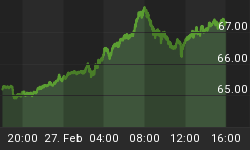Why are Agri-Food prices rising and stock prices falling? Does a connection exist? Do the markets understand that world is shifting to a new reality? In past decades, around the world a vast amount of money was squandered creating surplus housing and investment bubbles. In same era, little was done to deal with with growing inadequacy of world's ability to feed itself. In the coming years, only way of balancing Agri-Food demand and supply is through higher prices. China, acknowledging global shortages, has implemented export taxes on wheat, rice and corn. The intent is to prevent grain from leaving the country. China is not alone in such actions. Are governments moving to hoard grains?

2007 was indeed a rare year for Agri-Foods. U.N. Food & Agriculture Organization(FAO) estimates that global food production rose almost 5% in 2007. Yet, prices for most important Agri-Food commodities moved to near or above record prices. Only way this can happen is by exceptional growth in demand. That demand is being fueled by income growth in China, India, et al. That income growth is creating a structural investment opportunity. That all said, 2008 looks to be another record year for Agri-Food production. That reality, combined with technically over bought market conditions, is likely to create the first meaningful test of Agri-Food prices in almost two years. This Spring, as planting intentions become known, a correction in prices is likely. That could provide investors a rare opportunity to make some timely Agri-Food investments.
AGRI-FOOD THOUGHTS are from Ned W. Schmidt,CFA,CEBS, publisher of Agri-Food Value View, a monthly exploration of the Agri-Food grand cycle being created by China, India, and Eco-energy. To review a recent issue write to agrifoodvalueview@earthlink.net.
We have also released U.S. Agricultural Land As A Portfolio Consideration - 2007. This report is a critical analysis of the returns on U.S. agricultural land versus U.S. equities. It concludes that the investors would be wise to replace equities with an investment in U.S. agricultural land. This analysis is largely statistical in nature, and designed for the sophisticated investor. Order it at http://home.att.net/~nwschmidt/Order-AgLand2007.















